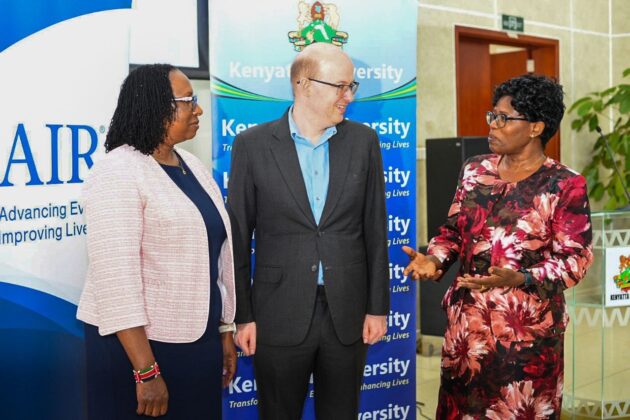
Evidence based research needed for Climate Change Impacts on Food Systems and Health. » Capital News
NAIROBI, Kenya, Oct 27 – Even as the world is grappling with severe climate-related challenges, there is a dire need for evidence-based policies and strategies to counter the threat on human health and survival.
It is on this context that experts, policymakers, researchers, and industry leaders gathered at Kenyatta University for a wide-ranging conversation on the escalating effects of climate change in Kenya and how to build resilience and adaptation in its citizens.
The conference under the theme Climate Change Resilience, Adaptation, and Its Impacts on Food Systems and Health in Kenya, was co-hosted by the American Institutes for Research (AIR).
Dr. Eng. Festus K. Ng’eno, Principal Secretary for Environment and Climate Change emphasized the urgency of coordinated multi-sectoral efforts in reversing the trend.
“Climate change is no longer an abstract threat; it is a reality that we must confront now. We need swift and decisive action to safeguard our future and build a more resilient society,” stated
He emphasized the adoption of climate-smart agriculture, disaster risk management strategies, and community-based interventions to manage climate-sensitive diseases, such as malaria.
“By investing in climate-smart agriculture and health interventions, we can protect our people while also driving long-term development,” added Dr. Ng’eno.
In 2024, Kenya experienced unprecedented climate events, including record-breaking temperatures in Nairobi and the devastation of El Niño floods, which claimed over 300 lives and displaced nearly 300,000 people.
Participants discussed solutions such as drought-resistant crops, advanced irrigation techniques, and climate-smart farming to stabilize food production and reduce vulnerability.
“We are seeing and experiencing the devastating effects of climate change in Kenya and throughout the region and it’s a priority for our team of researchers and technical assistance leaders to collaboratively find, study, and help implement solutions.” noted Christine Kiecha the Managing Director for AIR’s Kenya office.
Kiecha added that by integrating survey data from impact evaluations with remotely sensed weather data, Kenya can better adapt to these issues.
Panelists also explored the rising prevalence of vector-borne diseases like malaria, as well as waterborne illnesses such as cholera, which are becoming more common due to changes in climate. Malnutrition was another key concern, with experts stressing the urgent need for a more resilient health system that can protect communities from the compounding effects of climate change on public health.
“Climate change is not just an environmental issue; it impacts every aspect of our lives—from agriculture to health, to water resources and infrastructure. A multidisciplinary approach is essential if we are to develop comprehensive solutions capable of meeting the challenges posed by climate change,” said Prof. Waceke Wanjohi, Vice Chancellor of Kenyatta University.
The conference concluded with the formulation of actionable recommendations aimed at shaping national policies and strategies that will help Kenya adapt to the ongoing climate crisis.
About The Author